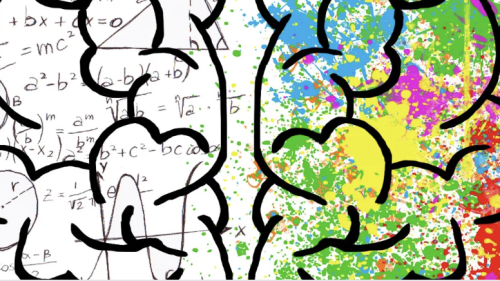A visual arts education provides academic achievement, social and emotional development, civic engagement, and equitable opportunity. Art education also leads to increased self-confidence and self-understanding, enhanced communication skills, and improved cognition.1
In a nationwide public opinion survey conducted by Americans for the Arts in 2016, findings included:
- Americans consider the arts part of a well-rounded education: An overwhelming majority of the American public (88%) agrees that the arts are part of a well-rounded K-12 education—including 56% who “strongly agree.”
- Arts education is important at all grade levels: Nine-in-ten American adults believe that it is important for students to receive an education in the arts including dance, media arts, music, theater, and visual arts as part of the curriculum in elementary school (88%), middle school (90%), and high school (89%). This is a change from past studies that have shown a drop-off in support for arts education as students enter high school.
- Out-of-school arts experiences are important, too: The value of arts education is not limited to just the in-school experience. 83% also agree with the importance of the arts to students outside of the classroom and throughout the community.
Art education connects us all with our culture, our community, and our world.
Why Kent State University?
As one of the foremost art education programs, Kent State faculty members are active leaders in the field. Current faculty research interests range from design education to gender studies, teaching art to students with autism, and global art education. Learning under the guidance of faculty with varied research areas helps you to develop your own personal teaching philosophy. Enthusiastic instruction in classes under twenty-five students provides you with personal attention and feedback on your growth and learning.
Kent State University art education students participate in our own active National Art Education Association Student Chapter. Many attend the national and the state annual conventions where they learn about the newest innovations in the field, create friendships, and establish networking relationships. In addition to travel study opportunities to national and state conventions, all students have the opportunity to enroll in travel study art education courses in Italy, China, and New York City.
The Online Master of Arts in Art Education program is an accredited institutional member of the National Association of Schools of Art and Design, the School of Art offers degree programs in Art Education that are approved.
Enroll today in the Online Master of Arts in Art Education at Kent State University
The Online Master of Arts in Art Education provides the same rigorous curriculum as the campus-based program. This distance-learning program is designed for Pre-K-12 art educators in public and private schools, museums, and enrichment classes who wish to continue with graduate study in the field of art education.
Licensed art education teachers who complete an art education master’s degree at Kent State University develop a focused competence in the visual arts as well as an intellectual understanding of the history and current issues of the field of art education. Students complete a course on quantitative and qualitative approaches to research and then select to do a research study with a thesis or a master’s project option.
Our program addresses all of the visual arts, as defined by the National Art Education Association, to include both contemporary art and design. Addressing both will prepare you to make a powerful contribution in guiding students in their cognitive, social, and emotional development as they prepare for college, careers, and citizenry.
The program at Kent State provides coursework in studio practice and art history in conjunction with theoretical research in art education pedagogy. Once the candidacy exam is passed, students may choose a thesis or project option as a capstone experience. The thesis culminates in a document that is based on scholarly research on an art education-related topic. The master’s project involves research that focuses on participant/researcher studies in curriculum, classroom settings, grant implementation, and/or community-based projects.
For more information on Kent State’s Online Master of Arts in Art Education, visit https://onlinedegrees.kent.edu/degrees/master-of-arts-in-art-education.
1 Retrieved on June 22, 2021, from https://www.edutopia.org/blog/creativity-academics-power-of-arts-education-neil-swapp




